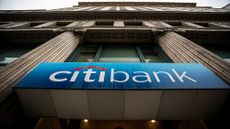Companies cut back on benefits
And more of the week's best financial insight

Here are three of the week's top pieces of financial insight, gathered from around the web:
Interest rates clobber small caps
Small-cap stocks have fallen way behind bigger peers, said Hardika Singh and Jack Pitcher in The Wall Street Journal. "The S&P 600, an index of small companies with an average market value of $1.8 billion," has rebounded somewhat on bets the Federal Reserve is done raising interest rates. However, it still "trails its large-cap counterpart by the widest margin in a calendar year since 1998," returning just 0.1% this year compared with 17% for the S&P 500. Higher rates have hurt smaller companies more than their larger peers, who can lock in borrowing costs years earlier. "Interest expenses have surged" for those not so fortunate. TV broadcaster E.W. Scripps said the $57 million it paid in interest in the third quarter exceeded its operating income.
Companies cut back on benefits
Employee perks are hitting the chopping block, said Irina Ivanova in Fortune. Tuition assistance, charitable-gift matching and even dental insurance are starting to be retracted from offers, according to a Glassdoor analysis of workplace trends. "Mobile phone discounts, which were available at a majority of employers six years ago, have fallen off a cliff." Same with gym memberships, "which were all the rage among tech-sector employers in 2019." Companies are looking to cut costs in a tight monetary environment and more benefits are coming under scrutiny. But not everything. Glassdoor found that "benefits that focus on family — including adoption or fertility assistance and parental leave — have grown sharply." Offering these policies can be "surprisingly cheap," since they’re used by only a small portion of employees.
Subscribe to The Week
Escape your echo chamber. Get the facts behind the news, plus analysis from multiple perspectives.

Sign up for The Week's Free Newsletters
From our morning news briefing to a weekly Good News Newsletter, get the best of The Week delivered directly to your inbox.
From our morning news briefing to a weekly Good News Newsletter, get the best of The Week delivered directly to your inbox.
Short sellers team up with regulators
Short sellers earn cash on the side as Wall Street whistleblowers, said Austin Weinstein in Bloomberg. Big-name short sellers such as Nate Anderson, the founder of Hindenburg Research and Carson Block of Muddy Waters have been sharing some of their bombshell research with the Securities and Exchange Commission’s whistleblower office. "If the SEC investigates and levies a fine" over $1 million, whistleblowers "can collect up to 30 percent of the proceeds." Tipping off the agency doesn’t preclude short sellers from making money by betting against a company’s stock. "Some SEC officials are queasy about using material from short sellers," but it does make their job easier. "A good short report can cut months or years off of an investigation."
This article was first published in the latest issue of The Week magazine. If you want to read more like it, you can try six risk-free issues of the magazine here.

Continue reading for free
We hope you're enjoying The Week's refreshingly open-minded journalism.
Subscribed to The Week? Register your account with the same email as your subscription.
Sign up to our 10 Things You Need to Know Today newsletter
A free daily digest of the biggest news stories of the day - and the best features from our website
-
 5 X-plosive cartoons about Elon Musk
5 X-plosive cartoons about Elon MuskCartoons Artists take on his proposed clean-up of X, his views on advertisers, and more
By The Week US Published
-
 2023: the year of superhero fatigue
2023: the year of superhero fatigueThe Explainer The year may represent the end of an era for Hollywood
By Brendan Morrow, The Week US Published
-
 Recipe: roast garlic mushrooms with parsley and eggs by Gelf Alderson
Recipe: roast garlic mushrooms with parsley and eggs by Gelf AldersonThe Week Recommends A simple and classic breakfast combination
By The Week UK Published
-
 OpenAI: A boardroom coup wrenches the AI world
OpenAI: A boardroom coup wrenches the AI worldFeature OpenAI employees are asking the board to resign
By The Week US Published
-
 Five key takeaways from Jeremy Hunt's Autumn Statement
Five key takeaways from Jeremy Hunt's Autumn StatementThe Explainer Benefits rise with higher inflation figure, pension triple lock maintained and National Insurance cut
By Harriet Marsden, The Week UK Published
-
 Electric vehicles: Automakers fail to dent Tesla’s lead
Electric vehicles: Automakers fail to dent Tesla’s leadFeature The demand for EVs remains high, but sale numbers show a dip
By The Week US Published
-
 Bank accounts caught up in red tape
Bank accounts caught up in red tapeFeature And more of the week's best financial insight
By The Week US Published
-
 Self-service tills: the backlash begins
Self-service tills: the backlash beginsTalking Point Booths, the supermarket chain known as the 'Northern Waitrose', has decided to reintroduce humans to the checkout process
By The Week UK Published
-
 Don’t count on working forever
Don’t count on working foreverFeature And more of the week's best financial insight
By The Week US Published
-
 Bankman-Fried: A con artist's day of reckoning
Bankman-Fried: A con artist's day of reckoningFeature How the crypto king's downfall might actually begin to restore trust in the crypto market
By The Week Staff Published
-
 Citibank to cut off online access for customers who don't go paperless
Citibank to cut off online access for customers who don't go paperlessSpeed Read The bank will shut off the customer's access to both their online website and mobile app
By Justin Klawans, The Week US Published










